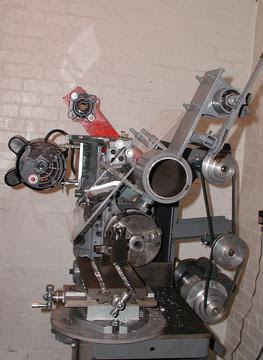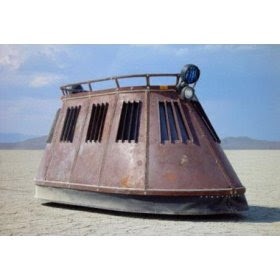Today I'm writing with a religious motif and maybe even religious hyperbole. I am playing a fool's game of "divining" meaning from ancient pasts and prophesying the future. Here I go...
I can't really "know" what happened in extremely remote history, but I do know the narratives that survived to my time, and can preach on their relative value -which old stories are worth less by virtue of whoever draws semantic sustenance and guidance from them will become manipulated lower-humans we (those drawing from better information) work to death. Or, more likely, they just die off by living in the spatial-temporal poorest choice, killed by the fitness question imposed from an evolutionary god who has no malevolence.
The first narrative structure of the Bible is the story of the Garden of Eden. My favorite deconstruction of this tale is to look at its regional origin, the Fertile Crescent and Mesopotamia. In that birthplace of military conscription and urbanity, the Garden story stands as primordial antecedent. The Garden has a corporeal relevance in those old river valley civilizations, the Garden is simply
a over-the-top idealization of oasis autonomous culture. An oasis culture would have had fruit dropping off the trees, water, intimate family, no government, and naked people mating with no need for a sense of taboo. To further cinch my tying the Garden to oasis cultures, think of the one Big Threat that would chase everyone from an oasis paradise. A large snake.
Imagine what a tale of simple living the Garden was to both the urban Mesopotamian/Egyptian and ever-warring, ever-wondering pastoralist.
The warcraft and scalable, specialized economy of Sumeria spread to almost all of the Eurasian continent long before the European conquests of the New World. To me, the heritage that goes back to Sumerian warcraft and economy is the basis of difference between the colonialists and the natives who were easily overwhelmed. Mesopotamia's story of primordial simplicity of the Garden was still alive across the New World.
It is fine when a nude Adam and Eve, with no taboos and no need to work, live on pages of a book. But when they occupy real land, and they are discovered by Eurasia, with its heritage of warcraft and scaled economy, its time to kill off Adam and Eve or put them to work.
An oasis dweller has no rights, because a platonic utopia has no legitimacy for space on Earth.
So we are through with the easy genocide of Adam and Eve, and note how the story, if lived and literal, is an undesirable lot.
Moving on to today, and something analogous.
Movies of the 20th century have this structure: peaceful setting of family/village/company offices/farm/automobile plant;
an obligatory scene or scenes in which all are in a normalized routine that is mundane, some petty bickering that is more for fun than being mean, flirting, children running, someone singing while walking or working. Then something that is a surprise and ominous (such as Clint Eastwood in High Plains Drifter) comes into the screenplay, or something hugely evil such as a Death Star, Decepticon, Cujo, Illyria, asteroid, or the Event Horizon.
The first thing wrong with this narrative form is the feeling of entitlement to peace we assume for the first scene people. Nothing wrong with Hollywood scriptwriters using this emotion if the audience has it to be exploited, Hollywood's just trying to
make every buck they can. What is wrong is us having this emotion of entitled peace.
The second thing wrong is also the second thing on the storyboard. The impetus for change and adaptation is a bad guy, or a whole bad Empire with a guy named Darth as Project Leader. Its, like, always some Nazi, messin up our bong hit, man.
Entitlement, to peace with no contingencies attached ( or shown in the story ). And adaptation. It is rarely the antidote after evil upsets the peace, but rather a Thor-Messiah reaches out and touches someone bad with the hammer. The villagers get to go back to their entitled carefree existence, such as the last scene of boy-on-boy-ass-slapping in the bed in the Lord of the Rings movie.
All entitlement and no adaptation makes Jack a dead body.
Ok, enough beating us all up over our dominant pleasure narrative of the last century. What is the answer to making this better?
Hollywood has willingly blown up this convenience store nutrition-narrative a few times. Clint Eastwood did it a little. Some zombie movies did. But this was just nihilistic shock, not a lot of useful info on what the right system of thought
would be.
The right system of thought would be eternal pragmatism, eternal sense of contingency, eternal vigilance. Not a mean spirited leaving behind of emotional attachment, not in love with "change" to the point of infatuation, but a knowing that the world is full of wrong places to live and best places to live. And making a move now if you live in the wrong place.
By place I might mean anything from house, job, whole town, region, nation, or religion.
In the 80's or 90's Yuppies were made fun of in the press. Wow, kinda got that wrong. Lets go visit the pathetic dumbasses in the cancer ward of a Louisiana hospital. They stayed in their little petrol-chemical town, a press featuring stories that made them proud of their lack of mobility, and watched the smart nerd move on to less polluted regions. Wrong move, or non-move as the case might be.
Move. Not necessarily to the most wealthy position, its not that simple. Move to where its safe. Down is a watchword for me.
The bad things are likely to be thrown down-wind ( pollution), down-stream( pollution and water overuse from upstream), and certainly on low lying land near water is a bad idea. Move to where, if law and social order break down, you don't have windows easily gotten into ( never live on the first floor ), and good guys with guns will be more prevalent than bad guys with guns. Or places with lots of ice or ocean that keep poor bad people far away.
Adapt. Safety will be technological, the "good life" much more so.
Give others a break, and a chance, and some margin for error, but do not corrupt this rational level of compassion with unlimited sense of connection with those who will die in the jaws of civilization disruption.
In the new kind of narrative for survival in the 21st century, we should easily give bad press for some places, dishonor traditions that produce hideously deformed people, and mock those who died holding on to the welcome sign of Shitville. On the positive, we should be screaming from rooftops about the best life practices, about the most enabling skills, about the points on Earth where intelligence finds expression and crime is abnormal. We should want to share information on what works.
In America, the Old Left and the Old Right are doing little to enable the above narratives and dialogues. But then, their constituents are those who won't move or won't adapt. Rich and poor alike in their more passive followers, they are energized by media that reveres their lifestyle as a civil right, when civil rights were intended to protect equal access to adaptation and change more than economic equality of statically defined lifestyles. Those who believe their lifestyle sacred and protected miss the point that their lifestyle is protected from harassment but not from becoming the walking dead adhering to a static, deterministic biography.
The smart walk away.









 The
The Flyrite Bobber
Flyrite Bobber




